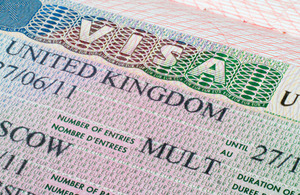Changes include extending the scope of the domestic violence provisions in EU Settlement Scheme
A new statement of changes to the Immigration Rules (CP 232) has been published today.
 Image credit: UK GovernmentYou can access it, and the accompanying explanatory memorandum, here on Gov.uk. The direct link for the main 27-page statement of changes is here.
Image credit: UK GovernmentYou can access it, and the accompanying explanatory memorandum, here on Gov.uk. The direct link for the main 27-page statement of changes is here.
The explanatory memorandum says the changes will:
- Make adjustments to the EU Settlement Scheme;
- Make updates to the Start-up and Innovator categories;
- Implement a number of minor corrections and amendments to the rules
The changes will take effect on 4 June 2020, while the changes to the EU Settlement Scheme take effect on 24 August 2020.
The changes to the EU Settlement Scheme include extending the scope of the domestic violence provisions. The explanatory memorandum notes:
"In line with the Withdrawal Agreement and the Free Movement Directive, this is currently limited to a former spouse or civil partner whose marriage or civil partnership has been legally terminated and who was a victim of domestic violence or abuse while the marriage or civil partnership was subsisting. Consistent with the Government's wider commitment to tackling domestic violence or abuse and protecting victims of it, the changes will mean that any family member within the scope of the EUSS (a spouse, civil partner, durable partner, child, dependent parent or dependent relative) whose family relationship with a relevant EEA citizen (or with a qualifying British citizen) has broken down permanently as a result of domestic violence or abuse will have a continued right of residence where this is warranted by domestic violence or abuse against them or another family member. They will be able to rely on this, together with their own continuous residence in the UK, in applying for status under the EUSS."
The changes also bring family members of the people of Northern Ireland within the scope of the EU Settlement Scheme, with the explanatory memorandum explaining: "This will mean that eligible family members of the people of Northern Ireland will be able to apply for UK immigration status, under the EUSS, on the same terms as the family members of Irish citizens in the UK. This immigration status will be available to the family members of all the people of Northern Ireland, no matter whether the person of Northern Ireland holds British or Irish citizenship or both, and no matter how they identify."
The Guardian has more on this change here, noting: "The move is a major victory for Emma de Souza ending a three-year battle to be recognised by the Home Office as Irish, a right enshrined in the Good Friday Agreement (GFA) ... The change in law will have wide-reaching implications and enable all citizens in Northern Ireland the right to have a non-EU or non-EEA country spouse remain in the UK without having to go through the Home Office’s onerous and costly immigration system."
The Start-up and Innovator categories are subject to a number of changes. The explanatory memorandum states:
"Changes are being made to make it clearer that, to be endorsed, applicants must be founders of their businesses and be relying on their own business plans. These changes also clarify that an Innovator applicant's business may be already trading, providing they were one of its founders.
"A provision is being added for decision makers to request further information or evidence from applicants or their endorsing bodies, if they have concerns that an endorsement has been issued inappropriately, and to refuse applications if they are not satisfied the endorsement criteria have been met.
"The 'viability' criteria are being amended to also require that a business plan must be realistic and achievable based on the applicant's available resources.
"The policy around applicants who wish to change their business venture, previously only set out in guidance for endorsing bodies, is being added to the Immigration Rules. This sets out that applicants may change business venture, providing their endorsing body is satisfied the new venture meets all of the criteria for endorsement. The applicant does not need to obtain a fresh endorsement or make a fresh application."
Zoe Bantleman of Richmond Chambers has a useful blog post about these changes here.